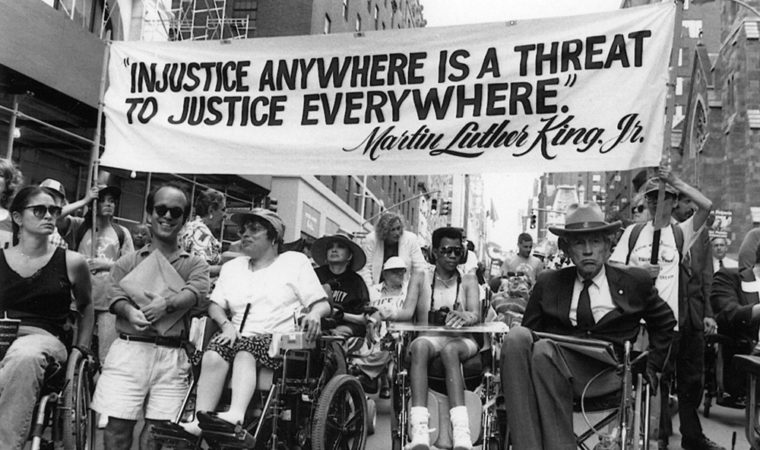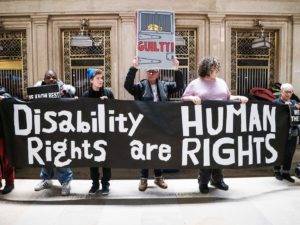Written by Mackenzie Saunders:
People often say the phrase, “Know your rights.” But why is knowing your rights so important? The answer is simple: knowing your rights is the only way you can protect yourself from discrimination and exclusion. If you know your rights, you’ll know how to deal with different situations that may arise throughout your lifetime—especially if you are a person with a disability
People with disabilities face discrimination and exclusion on a daily basis, but there are many different laws in place that can help protect people with disabilities from these situations. Knowing your disability rights is powerful, because you have the knowledge of how the law protects you and what to do when you experience legal barriers. Read below to learn about some of the most impactful disability laws in the United States, so that you can know your rights.
ADA Title II: Your Right to State and Local Services
The Americans with Disabilities Act (ADA) Title II protects people with disabilities from exclusion and discrimination in state and local spaces. All state and local services are legally required to be accessible to people with disabilities, regardless of whether or not the entity receives federal funding. Title II also makes it illegal for a state or local worker to refuse service to someone with a disability simply because the person is disabled. These Title II regulations apply to different public and local spaces such as schools, parks, and stadiums.
If you face a Title II violation, you have the right to file a lawsuit against the party at fault. A successful Title II lawsuit can grant you compensation and require the entity to fix their Title II violation for the future.
ADA Title III: Your Right to Private Goods
and Services
Title III of the ADA protects people with disabilities from exclusion and discrimination regarding private goods and services. Title III requires private entities to provide equal access to their goods and services, meaning that people with disabilities and people without disabilities should both be able to access all private goods and services. This means that private entities must be accessible, and that private entities must provide accommodations to consumers with disabilities when needed. Examples of different private spaces that are included in Title III are airports, theaters, restaurants, and hospitals.
If you face a Title III violation, you have the legal right to sue the party at fault. A successful Title III lawsuit can grant you compensation and require the party at fault to fix their Title III violation for future consumers.
ADA Title VII: Your Right to Employment
ADA Title VII protects people with disabilities from harassment and discrimination in the workplace. Under Title VII, it is illegal for employers and workers to discriminate against or harass someone with a disability in the workplace. This means that people with disabilities cannot be rejected from a job on the basis of their disability, and workers with disabilities cannot be harassed or treated unfairly in the workplace because of their disability. Title VII also requires employers to provide their workers with disabilities with the reasonable accommodations they need to perform their job requirements.
If you face a Title VII violation, you have the legal right to sue the person, people, or company at fault. A successful Title VII lawsuit can grant you compensation and require the party at fault to fix their Title VII violation for future workers with disabilities.
Section 504 of the Rehabilitation Act: Your Right to Federally Funded Resources
Section 504 of the Rehabilitation Act was designed to protect people with disabilities from discrimination by any entity that receives federal funding. This law protects K–12 public school students from discrimination in educational environments, and Section 504 gives students with disabilities the right to receive an equally fulfilling education compared to their non-disabled peers. Other federally-funded entities such as hospitals and airports are also included in Section 504. People with disabilities have the legal right to access all goods and services from federally-funded entities, and must be provided with the equal opportunity to participate in federally-funded settings and activities.
If you face a Section 504 violation, you have the legal right to sue the party at fault. A successful Section 504 lawsuit can grant you compensation and require the entity to fix their Section 504 violation for the future.
Fair Housing Act: Your Right to Housing
The Fair Housing Act legally protects people with disabilities from discrimination while buying a home, renting a home, getting a mortgage, or finding housing assistance. Under The Fair Housing Act, it is illegal to refuse to rent or sell a home to someone because they have a disability. This law also protects people with disabilities from being harassed, unfairly evicted, or discriminated against by their landlords and property owners. The Fair Housing Act also gives people with disabilities the right to get a mortgage or a loan for housing; it is illegal to deny a person a mortgage or loan on the basis of their disability.
If you face a Fair Housing Act violation, you have the legal right to sue the person, people, or entity at fault. A successful Fair Housing Act lawsuit can grant you compensation and require the entity to fix their Fair Housing Act violation for the future.
Know Your Disability Rights and Be Your Own Best Advocate
Knowing your rights as a person with a disability is essential to living a safe and happy life. While there are many disability laws that grant legal rights to people with disabilities, these rights are still violated on a daily basis. However, if you know your rights, and if your rights are violated, then you can file a lawsuit against the party at fault and receive the justice and compensation you deserve. You can be your own best advocate by knowing your rights and taking legal action when your rights are violated.
If your disability rights are violated, contact an experienced disability rights lawyer immediately. The Spinal Cord Injury Law Firm has vast experience defending the rights of people with disabilities, and we have won millions of dollars for our clients. Contact us today at 1-877-SCI-FIRM or info@spinalcordinjurylawyers.com for a free consultation to assess your legal options.


